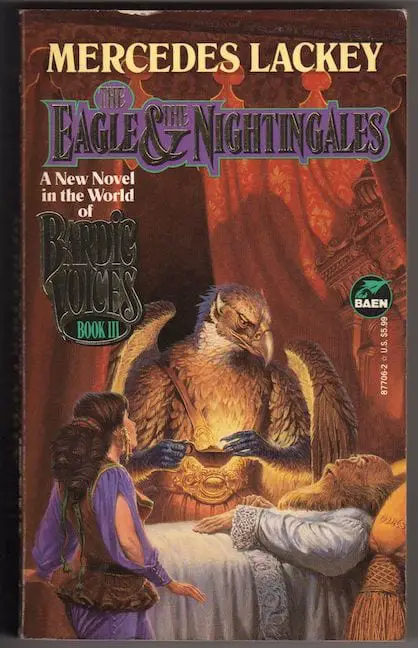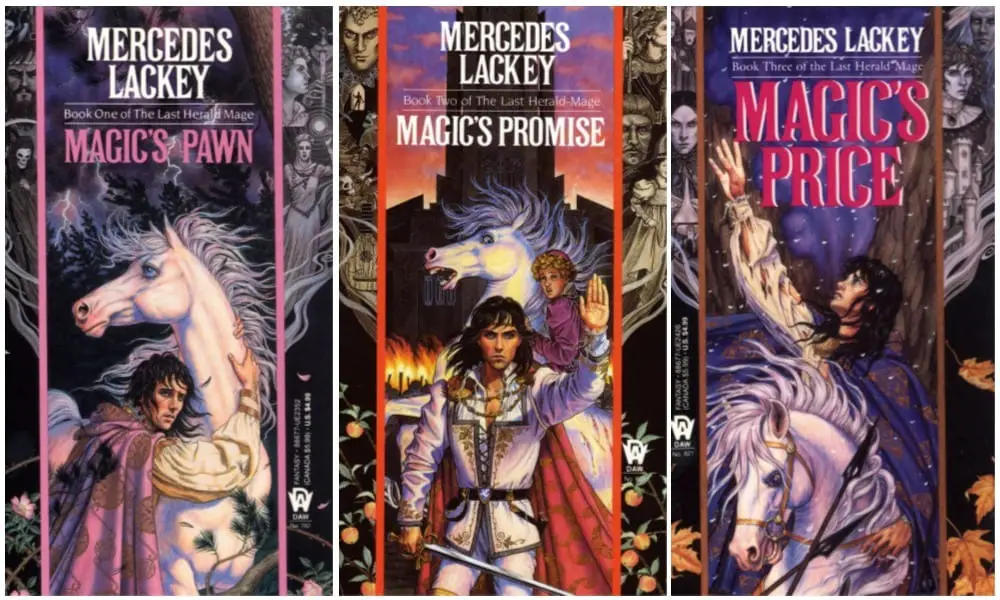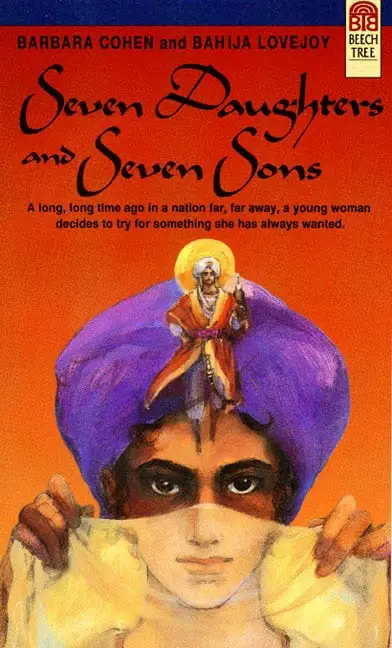This article is part of the My First Queer series, a site-wide series of articles written by some of our non-straight Fandomentals contributors. Each will contain their thoughts on their first experiences with queer media and what it meant to them. Enjoy!
Oh look, Gretchen is going to be writing about books, big surprise! Like Kristen before me in this series, I didn’t watch a lot of TV growing up. Books were my escape, especially fantasy books. As conservative evangelical Christians, my parents were all about making sure our little child brains were as free from the ‘corrupting influences of the world’ as possible, hence why I watched so little TV and why it took me so long to figure out I was queer. Fortunately for me, my parents trusted my instincts with books. Granted, I was a compliant child who didn’t go out of my way to find anything subversive. If the cover art wasn’t scandalous and the dust jacket seemed free of ‘questionable content’, I could read it.
With literally hundreds of books passing through my hands over the first decade and a half of my life, if I still remember a scene from a book I read only once and decades ago, it meant something to me. Sometime last year, I reflected on these handful of books seared into my soul. Once you look at them, it’s pretty telling why these are the stories I remember.
The Eagle and The Nightingales by Mercedes Lackey (1995)

Sometime in late middle school/early high school, I picked up one of Mercedes Lackey’s books at the local library and proceeded to devour every available book of hers I could get my hands on. I can’t remember which book of hers I read first, but they left an indelible impression on me.
Part of Lackey’s Bardic Voices series, The Eagle and The Nightingales tells the story of Nightingale a Free Bard (someone who wields magic through music) tasked with finding out why the human king and churches are growing overtly hostile to non-human sentient beings and other classes of people they cannot directly control. She joins forces with T’yfrr a member of the Haspur, a race of humanoid eagles who has an angelic voice. Over the course of the book, the two become not only quest partners, but lovers.
So what? I can imagine you thinking. What does a bard and a bird-man have to do with ‘my first queer’? Fair point, dear reader. On the surface, T’yfrr and Nightingale are differently gendered and so seem to fit a heterosexual mold. However, as a young teen, an interspecies relationship felt as ‘forbidden’ and ‘taboo’ as anything overtly gay. There was something…queer about it even if it featured a female human and a male humanoid eagle. Especially in the story’s context of non-humans being persecuted by the church (*cough cough*) and interspecies relationships being considered taboo by the church but accepted in T’yfrr’s culture. Conversations Nightingale has with T’yfrr mirror conversations Vanyel, one of Lackey’s openly gay characters, has about being attracted to men.
Ultimately, it’s a story about discrimination against marginalized people groups and finding love in unexpected places that your society might find taboo but that’s just their (wrong, bigoted) opinion. That struck a chord with me that I couldn’t label. I just really, really liked it okay? And it made a lot of sense to me and made me feel seen for some reason. (Like I said, really telling looking back.) It was also a really well-written story, the best of the Free Bard series (of which this is the third book), in my opinion. We won’t talk about Four and Twenty Blackbirds. I like to pretend that book never happened.
Admittedly, certain aspects of The Eagle and the Nightingales didn’t age well. While the complicated politics and theme of acceptance are still relevant today, the entire Free Bard series features ‘gypsies’ prominently. Lackey’s characterization of the culture she calls ‘gypsy’ is positive, if a bit stereotypical. The real problem is her use of the word ‘gypsy’ at all. I know, I know. This is a fantasy book from the 90s. In that context, her free use of that word to describe a nomadic, Romani-like people is understandable. At the same time, understandable doesn’t mean problem-free and I would be remiss, even in my reminiscences, to overlook that rather glaring issue.
The Last Herald-Mage Series by Mercedes Lackey (1989-1990)

This brings me to the aforementioned Vanyel. The three books in this series—Magic’s Pawn, Magic’s Promise, and Magic’s Price—tell the story of Vanyel Ashkevron, the greatest Herald-Mage in the history of Valdemar. He presents at first as a bored, coddled, vain pretty-boy disinterested in running his family estate. That veneer hides the reality that he’s an emotionally neglected, highly introverted and intuitive, sensitive child who suffers from his father being overbearing and believing he’s ‘not a proper man’. His homophobic father, who fears he is shay’a’chern, the in-universe term for gay, sends him to train as a swordsman to ‘make a man’ out of him.’
Vanyel meets a Herald-Mage trainee, Tylendel, who is openly gay and sparks Vanyel’s understanding of himself. The two become lovers and lifebonded (aka soulmates), but in a magical tragedy, Tylendel dies (don’t worry, I’ll come back to this). The event also awakens Vanyel’s mage gift. In the aftermath, he learns he possesses all of the Heraldic gifts and becomes the most powerful Herald-Mage to ever exist. Eventually he meets another shay’a’chern couple from the mysterious human clan of the Tayledras, the Hawkbrothers known as Moondance and Starwind. Being gay in their society is not taboo, so they teach him to accept his orientation as normal and beautiful. He also meets a bard named Stefan, the reincarnation of his soulmate Tylendel.
Vanyel dies at the end of the series fighting against Valdemar’s enemies. However, that’s not the end for him. He’s given a choice to continue protecting Valdemar, so he, Stefan/Tylendel, and Vanyel’s psycially linked horse Companion Yfandes (it makes sense in context, I promise; she’s like a platonic soulmate who helps him with magic) become spirit protectors on Valdemar’s border.
Admittedly, Lackey killing of Tylendel to awaken Vanyel’s mage gifts doesn’t sit well after recent conversations about the representation of queer characters. Maybe I’m nostalgic and too kind because of what these books meant to me, but the events never struck me as Bury Your Gays (BYG), even as a kid. Lackey goes out of her way to normalize Vanyel’s sexuality, villainize his homophobic father, an even reincarnates Tylendel in the form of Stefan.
Vanyel’s heroic sacrifice at the end doesn’t feel like BYG either. His death isn’t intended to punish him for being gay, which is the root of the BYG trope. In fact, he gets a happy ending, even in death. He, his soulmate Tylendel/Stefan, and his platonic soulmate Companion Yfandes live forever doing what he wanted most in the world: protecting Valdemar.
Oh, and he has four biological children to carry on his legacy, though I honestly can’t remember how the sperm donor thing worked. Twins Brightstar and Firefeather are raised by the Tayledras shay’a’chern couple Vanyel meets. He also fathers Avren, the daughter of lesbian swordfighters in his older sister Lissa’s command. Most important is Jisa, daughter of Shavri, the king’s co-consort. Basically, the king is infertile but no one knows that, so Vanyel agrees to be the donor in secret. As Jisa ends up marrying the heir, the entire rest of the royal line in the Valdemar series descends from Vanyel.
Plus, Vanyel’s story is so central to the worldbuilding and history of Valdemar that without him, the rest of Valdemar wouldn’t make sense. So even in hindsight, I have a hard time labeling this as BYG. He’s just too important a character and everything else about the story resists being boiled down to, “he and Tylendel died because they were gay.”
Anyway, back to why these books were important to me. I related to Vanyel on a deeply personal level. He was introverted, misunderstood, and suffered from both neglect and direct emotional and verbal abuse. He’s deeply emotional and struggles with depression. He’s mocked by friends and family for being ‘moody’ and not fitting into society’s expectations for his gender. Because of the abuse he suffered, he both feared and desperately wanted intimacy yet denied himself the opportunities to open up for fear of getting hurt. Hey! That was me. Reading about Vanyel felt like Lackey had peered into my soul and put what she found on page. And that was aside from him being gay.
Even though reading these books didn’t immediately make me understand my sexuality, following Vanyel’s journey of discovering his sexual orienation deeply impacted me. I got to read it in real time, watch him figure it out, struggle with the implications, and learn to accept and embrace it by being told it was normal. He gave me the first glimpse of something I didn’t realize was true of myself. I just really, really liked and identified with him okay? I was a shay’a’chern…ally.
Seven Daughters and Seven Sons by Barbara Cohen and Bahija Lovejoy (1994)
 Before Lackey, there was Lovejoy and Cohen’s Seven Daughters and Seven Sons. I read this in 5th grade, having picked it off of my teacher’s classroom library shelf because it was based on an Iraqi folktale. I loved (and still do love) all kinds of folktales, myths, and fairy tales, especially non-Western stories. Buran’s story became my favorite, though over time I forgot the title and it took me years to track it down again.
Before Lackey, there was Lovejoy and Cohen’s Seven Daughters and Seven Sons. I read this in 5th grade, having picked it off of my teacher’s classroom library shelf because it was based on an Iraqi folktale. I loved (and still do love) all kinds of folktales, myths, and fairy tales, especially non-Western stories. Buran’s story became my favorite, though over time I forgot the title and it took me years to track it down again.
Buran is the fourth of seven daughters living in Baghdad. Everyone in the city shuns her father for not having sons; her uncle—father to seven sons—especially like to throw Buran’s family’s poverty and seeming lack of favor from Allah in their face. Not content to see her family suffer, Buran disguises herself as a man, travels to Tyre, and sets up shop as a successful merchant while maintaining her masculine disguise.
Mahmud, the prince of Tyre visits her shop often, and Buran finds herself falling in love with him and he with her, though she’s still disguised as a man. Soon after he realizes his in love with Buran-in-disguise, Mahmud has a moment where he begins to wonder if she is a woman. So, he sets about testing her to prove her gender. Fearing discovery and the loss of friendship and her business she uses to support her family, Buran uses her wits to pass Mahmud’s first two tests. The third, to meet him at the baths, she flees from as it would reveal her identity. Donning women’s clothing, she heads home, encountering two of her male cousins, whose position in life has much diminished since she left. Her family, on the other hand, is rich and her sisters have married well due to her business acumen.
Her family pressures her to marry, but her heart belongs to Mahmud, though she cannot admit it. Rejecting social expectations of her, Buran determines to never marry and leave her fortune to her sisters’ children. However, Prince Mahmud eventually finds her and the two get married and live happily ever after.
Stories about women who disguise themselves as men and have a prince fall in love with them exist in a strange limbo between queer and heteronormative, depending on how the author frames the prince. Lovejoy and Cohen straddle that line in an interesting way. On the one hand, the story lets the prince believe himself in love with Nasir—Buran’s masculine name—for almost two pages. There’s even a highly sexually charged scene between the two of them told from Prince Mahmud’s perspective. But then Mahmud has a rather convenient insight that Nasir is actually a woman in disguise. It simultaneously feels less homophobic than it could have been and as heteronormative as people who don’t want to acknowledge that Li Shang in Mulan was totally in love with Ping and flagrantly bisexual.
Still, as a child, it was eye-opening to read a story about a man who falls in love with another man, only to realize she’s a woman. And Buran was definitely a character I both admired and identified with. I, too, wanted to be more than what my conservative environment said a woman should be. I admired her courage, her intelligence, and her unwillingness to submit to societal expectations for what it meant to be a woman. There’s a bit of Not Like Other Girls, but no more than Vanyel felt like Not Like Other Boys. They’re both characters who didn’t quite fit in and found a way to embrace and celebrate who they were. Once again, to not-yet-aware-of-her-queerness-Gretchen something about Buran and Mahmud struck home.
And then there was the scene where Buran strips naked and looks at herself as a woman after living as a man for years.
“When I got back to my room, my own safe little room in Jihha’s house, I bade the servant leave the candle, and then I dismissed him. I took off all of my clothes, every single piece, and then I stared down at my naked self. I saw the gentle swell of my two breasts, small, but firm and high, with smooth golden flesh giving way to rosy nipples. I saw the slight curve of my belly, which would never, ever be absolutely flat, no matter how thin and hard the rest of me might be. Beneath my narrow waist, my two hips curved like two crescent moons and between my legs, black hair curled in tiny ringlets.” (p. 151-152)
Poor little 10-year-old baby bisexual Gretchen did not know what to do with the confusing feelings reading that passage awakened in her. I’ll be honest, this was the scene that stuck in my mind for years. Until recently, I had no idea why. Looking back now, I can 100% label it as the first viscerally, “Oh shit, I’m queer,” moment of my life. It only took me 20 more years to unpack it, but this book is the piece de resistance of young queer Gretchen.
—
So these were my first queer inklings. Strange, I know. Two of the stories weren’t even explicitly queer and the other featured a gay protagonist, not a woman-loving-woman (wlw). But they meant something to me. They planted seeds in my repressed, survival-mentality brain that would only come to fruition many years later. For a survivor of CSA and abuse who literally had no framework for understanding being a wlw, these books were the only shreds I had of a part of myself I didn’t have words for. Yes, they were problematic in some ways. Yes, they were imperfect matches to my own experience. But they were literally all I had.
As I said at the outset, these are stories I vividly remembered years later. Even if I couldn’t remember the name of the book, I remembered scenes or interactions that felt…significant to me in some unnamed as yet way. However flawed they are, they hold a special place in my soul.
They’re also the reason why I write mainstream SFF novels. I know there are other kids out there who don’t know they’re queer just like I didn’t. Kids who wouldn’t think to pick up a book explicitly labeled as ‘queer’ either because they don’t think that’s who they are or because their situation at home wouldn’t allow them to. (My parents would have banned any book labeled that way on sight.) Kids waiting to pick up a book about mages or queens or space colonists and see a protagonist who loves in a way they didn’t know was possible.
So in the end, they gave me even more of myself than I ever could have imagined. This is why stories matter.

